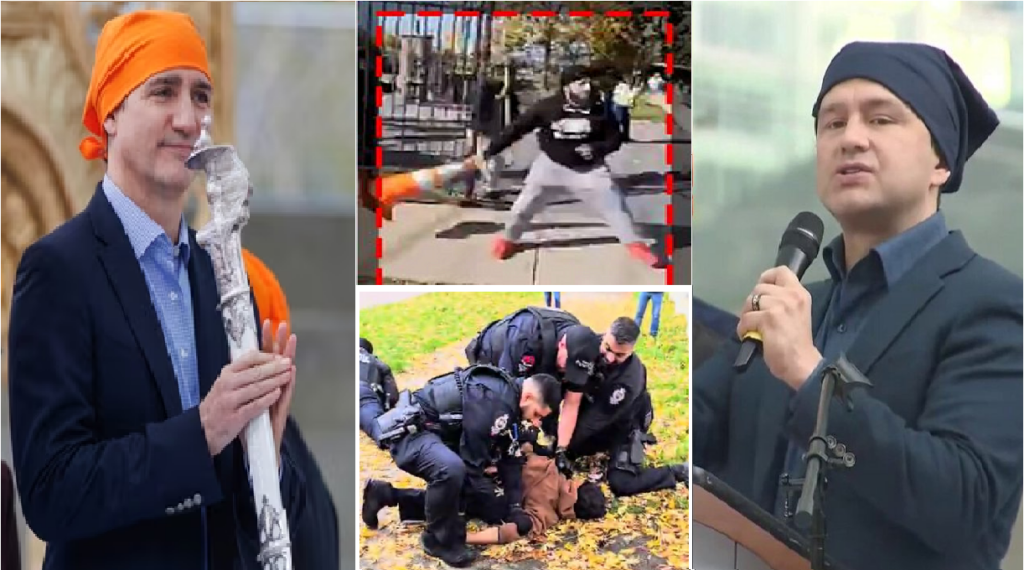
- The recent attacks on Hindu temples highlight the failure of the Canadian administration and political system to protect its Hindu minority from growing Khalistani extremism.
- Canadian authorities have been criticized for allowing the activities of Khalistani sympathizers under the pretext of freedom of expression, overlooking the mounting concerns of the Hindus.
- The recent incidents have raised questions about the possible infiltration of radical elements in the Canadian police and the government’s tolerance towards anti-India groups.
Khalistani extremism, backed by the incumbent government under Justin Trudeau, peaked in Canada with multiple pre-meditated attacks on Hindu temples in different cities in the country on a single day. The first such attack was on the Hindu Sabha Mandir in Brampton where the Khalistani extremists assaulted many devotees including women and children at the temple. A video of the attack was shared on X by the Hindu Canadian Foundation, a nonprofit that works for the interests of the Hindu population in Canada. The attack began outside the consular camp that was set up in cooperation with the Hindu Sabha Mandir.
The second attack on the same day was on the Laxmi Narayan Mandir, Surrey in British Columbia. A planned protest by Khalistani supporters was advertised in advance, targeting the temple with hateful and offensive messaging. Around 12 Khalistani extremists arrived with large posters bearing anti-India, anti-Modi, and Hinduphobic messages and provoked Hindu devotees with racial slurs. As Khalistani protesters attacked Hindu devotees, the Police randomly arrested Hindus who protested the attacks while another teenager was forcefully slammed to the ground by three officers.
The attacks at the Hindu temples were immediately condemned by the Indian High Commission in Canada, Indian PM Narendra Modi, External Affairs Minister Dr S Jaishankar, the Vishwa Hindu Parishad, and other Indian and Canadian leaders.
Systemic Rot of the Canadian Politics
These recent attacks on Hindu temples highlight the failure of the Canadian administration and political system to protect its Hindu minority from growing extremism. Prime Minister Justin Trudeau’s reluctance to take decisive action against anti-India elements, particularly pro-Khalistan supporters, is exacerbating the situation. Critics argue that his minority government, which relies on specific parliamentary support, avoids confronting these groups to maintain political stability. This inaction has boldened extremists, creating an unsafe environment for Hindus and other minorities, and signalling a lack of commitment to uphold religious freedoms in Canada.
Trudeau’s stance, amid strained India-Canada relations, reflects a deeper issue where the government’s priorities seem misaligned, failing to safeguard Hindu practices and contributing to the erosion of social harmony. Trudeau while condemning the attacks on the Hindu temple in a post on X, could not muster enough courage to even mention the perpetrators. This complacency risks Canada’s image as a safe haven for all religions and fosters an environment of division.
Even the leader of the opposition, Pierre Poilievre, who has refrained from openly condemning Khalistani separatism, has been accused of insensitivity toward Hindu practices, particularly when his party discouraged Diwali celebrations, alienating Hindu-Canadians further. Pierre Poilievre’s failure to identify Khalistanis following the attack on Hindus renders him equally reprehensible. The carefully worded statement by Pierre Poilievre, which omitted any reference to the attackers of the temple, who were undoubtedly Khalistani thugs, highlights the bipartisan capitulation of antisocial organisations and terrorist elements that have become ingrained in Canadian administration and have come to exert a significant amount of influence over its internal politics.
Safe Haven for Anti-India Extremists

Despite escalating tensions, including India-Canada diplomatic strain over accusations against Indian intelligence, Trudeau’s administration has allowed anti-India activities to persist. Canadian authorities have been criticized for allowing the activities of Khalistani sympathizers under the pretext of freedom of expression, overlooking the community’s mounting concerns. The recent incidents have raised questions about the possible infiltration of radical elements in the Canadian police and the government’s tolerance towards anti-India groups.
Prominent figures, such as MP Chandra Arya, have alleged that extremists receive a “free pass” and that there is a possible infiltration of pro-Khalistani elements within Canadian law enforcement. Arya was referring to the suspended cop Sgt. Harinder Sohi of the Peel Regional Police, who participated in the violent attack on Hindu worshipers at the Brampton Hindu Sabha Temple.
Indifference to Hindu Rights
Canada’s handling of these issues signals an indifference to Hindu rights, potentially fostering anti-India sentiment within Canadian society. This political environment reflects a deteriorating bilateral relationship with India, one strained by the Canadian government’s leniency toward extremists who propagate violence against Hindus and Indian nationals. The situation calls for a re-evaluation of Canada’s commitment to safeguarding all communities and addressing radicalism within its borders.
Strain in India-Canada Ties
The relations between the two countries came under severe strain following Trudeau’s allegations in September last year of a “potential” involvement of Indian agents in Nijjar’s killing. New Delhi rejected Trudeau’s charges as “absurd”. India has maintained that the main issue between the two countries is that of Canada giving space to pro-Khalistan elements operating from Canadian soil with impunity.
Prajwal K M holds a Master’s in Diplomacy, Law, and Business with a specialization in Economics and Foreign Policy. He is currently a consultant at the Nation First Policy Research Centre (NFPRC), a Delhi-based think tank working on policy design and implementation with the government. Formerly Deputy Editor at SamvadaWorld, his work focuses on the political and economic landscapes of West Asia and North Africa.
